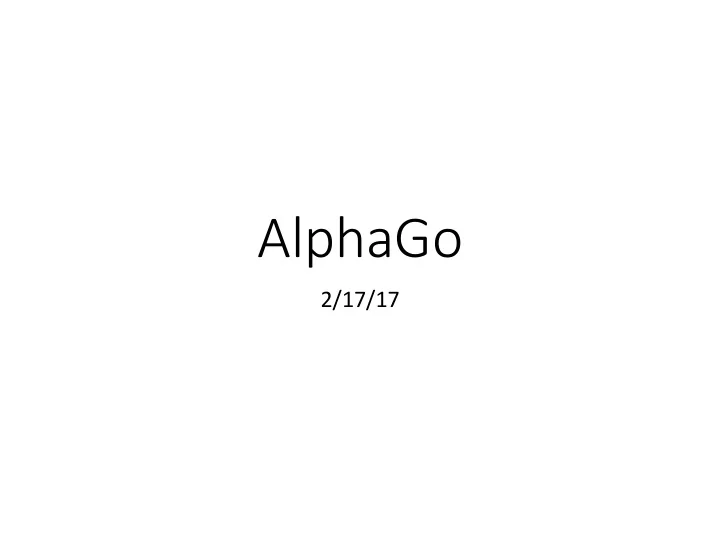

AlphaGo 2/17/17
Video https://www.youtube.com/watch?v=g-dKXOlsf98
Figure from the AlphaGo Paper neural networks regular MCTS
AlphaGo Neural Networks Tree Policy Default Policy
Step 1: learn to predict human moves • Used a large database of online expert games. • Learned two versions of the neural network: • A fast network P 𝜌 for use in evaluation. • An accurate network P 𝜏 for use in CS63 topic selection. neural networks weeks 8–9
Step 2: improve P 𝜏 (accurate network) • Run large numbers of self-play games. • Update P 𝜏 using reinforcement learning • weights updated by stochastic gradient descent CS63 topic reinforcement learning weeks 6-7 CS63 topic stochastic gradient descent week 3
Step 3: learn a better boardEval V 𝜄 • use random samples from the self-play database • prediction target: probability that black wins from a given board CS63 topic avoiding overfitting weeks 9-10
AlphaGo Tree Policy (selection) • select nodes randomly according to weight: • prior is determined by the improved policy network
AlphaGo Default Policy (simulation) When expanding a node, its initial value combines: • an evaluation from value network V 𝜄 • a rollout using fast policy P 𝜌 A rollout according to P 𝜌 selects random moves with the estimated probability a human would select them instead of uniformly randomly.
AlphaGo Results • Played Fan Hui (October 2015) • World #522. • AlphaGo won 5-0. • Played Lee Sedol (March 2016) • World #5, previously world #1 (2007-2011). • AlphaGo won 4-1. • Played against top pros (Dec 2016 – Jan 2017) • Included games against the word #1-4. • Games played online with short time limits. • AlphaGo won 60-0.
MCTS vs Bounded Min/Max UCT / MCTS MinMax/Backward Induction • Optimal once the entire • Optimal with infinite tree is explored or pruned. rollouts. • Can prove the outcome of • Anytime algorithm (can the game. give an answer • Can be made anytime-ish immediately, improves its with iterative deepening. answer with more time). • A heuristic is required • A heuristic is not unless the game tree is required, but can be used small. if available. • Hard to use on incomplete • Handles incomplete information games. information gracefully.
Discussion: why use MCTS for go? • We’re using MCTS in lab because we don’t want to write new heuristics for every game. • AlphaGo is all about heuristics. They’re learned by neural networks, but they’re still heuristics. • MCTS handles randomness and incomplete information better than Min/Max. • Go is a deterministic, perfect information game. So why does MCTS make so much sense for go?
Recommend
More recommend